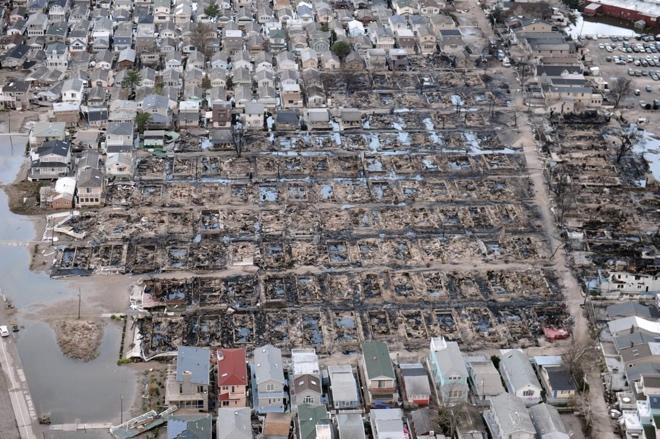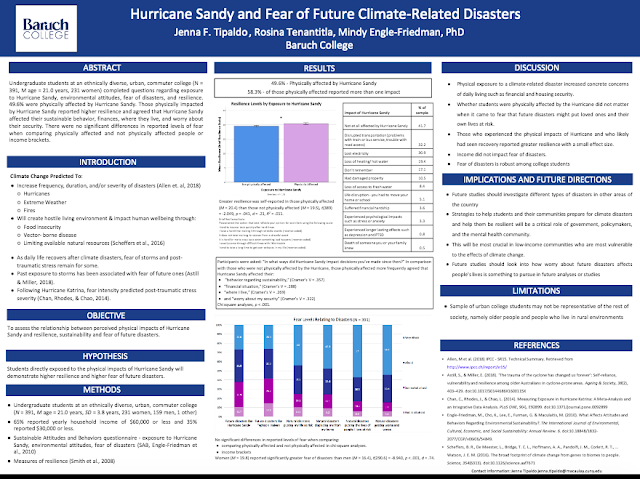Dealing with Mother Nature: Mental Health Following Natural Disasters
This article is dedicated to my Queens, NY community still recovering from Hurricane Sandy five years later, as well as victims of recent natural disasters. Originally published in Hunter College's Psychology News, Fall 2017 edition.
Natural disasters are extreme events that make headlines for their disruptive and destructive tendencies. Globally an average of 24.6 million people are displaced by a disaster each year (Ferris, 2016). Recent disasters have wreaked havoc on areas of the country, including the Tri-State Area, California, Texas, Florida, and Puerto Rico, destroying homes, schools, offices, and infrastructure disproportionately in economically and socially disadvantaged communities (Ferris, 2016). The aftermath of one such disaster may include the persistence of stressors, like disruption of daily activities and uncertainty related to housing and finances, having severe and long-lasting psychological implications.
Though stress is a normal component of life, when the body responds to prolonged or chronic stress, such as after a disaster, biological and chemical changes may occur. These changes may have adverse effects on the body referred to as an allostatic load (McEwen, 2000). Allostatic load may be impacted by behavioral and cognitive components as well, like how one perceives and responds to a stressful event (McEwen, 2000). Considering the stress that a natural disaster may cause to affected individuals, it is logical that studies have generally shown increased rates of disorders, such as PTSD, in survivors of various types of natural disasters (Arnberg, Bergh, & Michel, 2013; Mcfarlane & Van Hooff, 2009). A study following Hurricane Katrina demonstrated that “unresolved hurricane-related stresses” accounted for increased rates of serious mental illness and PTSD up to two years following the disaster (Kessler et al., 2008). However, the literature seems to be lacking overall in longitudinal studies that compare a control group to those exposed to a disaster over longer periods of time. The field could benefit from longitudinal studies to better understand the scope of the lasting effects of experiencing a disaster on psychological and physical health.
The effects of post-disaster stress may be seen across demographic groups as demonstrated by Kessler et al. (2008). Yet, the effects of a disaster may be amplified in already isolated or disadvantaged communities to begin with, especially subpar living conditions, poor flood defenses, or disrupted transit options that delay recovery. This could lead to an increased amount of chronic stress during a prolonged recovery period. Additionally, allostatic load may be impacted by socioeconomic status through disparities in physical health, financial and social instability, and early childhood experiences (McEwen, 2000). Lower income, minority, and immigrant communities may not have adequate levels of social support or as many resources to acquire adequate healthcare services, psychological, or otherwise. Because of this, psychologists must assume the responsibility of emphasizing mental health and supporting recovery efforts in vulnerable communities following a natural disaster. In addition, the American Psychological Association outlines several other key roles that psychologists may play after a natural disaster, namely providing information, coping and problem-solving strategies, and assurance that recovery is possible (Schwartzbard, 2014).

Source: http://www.nydailynews.com/new-york/queens/queens-residents-struggle-hurricane-sandy-damage-years-article-1.1987126
Forbes et al. (2015) recently found that anger and major life stressors may both play a role in the development of psychological disorders following exposure to a natural disaster, suggesting a targeted focus for future post-disaster interventions in the communities that may need it most. After Hurricane Sandy hit the Tri-State area, Northwell Health created an initiative called Project Restoration, focusing on a hard-hit area of Queens (Pinto, 2016). The program aims to “understand the long-term mental health impact” through screening adults and to “link those in need of mental health care with local providers” (Pinto, 2016). Analyzing the need for and effectiveness of clinical outreach programs may help to better manage the mental health implications of natural disasters, considering the increased frequency and severity of such disasters due to climate change.
References
Arnberg, F., Bergh Johannesson, K., & Michel, P. (2013). Prevalence and Duration of PTSD in Survivors Six Years After a Natural Disaster. Journal of Anxiety Disorders, 27(3), 347-352.
Forbes D., Alkemade N., Waters E., Gibbs L., Gallagher C., Pattison P., . . . Bryant, R.A. (2015). The role of anger and ongoing stressors in mental health following a natural disaster. Australian & New Zealand Journal of Psychiatry, 49(8), 706-713.
Kessler, R.C., Galea, S., Gruber, M.J., Sampson, N.A, Ursano, R.J, & Wessely, S. (2008). Trends in mental illness and suicidality after Hurricane Katrina. Molecular Psychiatry, 13(4), 374-384.
McEwen, B. S. (2000). Allostasis and Allostatic Load: Implications for Neuropsychopharmacology. Neuropsychopharmacology, 22(2), 108-124.
Mcfarlane, A., & Van Hooff, M. (2009). Impact of childhood exposure to a natural disaster on adult mental health: 20-year longitudinal follow-up study. The British Journal of Psychiatry: The Journal of Mental Science, 195(2), 142-8.
Pinto, M. (2016, October 27). Four Years after Hurricane Sandy – Mental Health Needs Still a Major Concern. [Press release]. Northwell Health Newsroom. Retrieved from https://www.northwell.edu/about/news/four-years-after-hurricane-sandy-%E2%80%93-mental-health-needs-still-major-concern
Schwartzbard, R. (2014, April). What psychologists do on disaster relief operations. American Psychological Association. Retrieved from http://www.apa.org/helpcenter/disaster-site.aspx
Natural disasters are extreme events that make headlines for their disruptive and destructive tendencies. Globally an average of 24.6 million people are displaced by a disaster each year (Ferris, 2016). Recent disasters have wreaked havoc on areas of the country, including the Tri-State Area, California, Texas, Florida, and Puerto Rico, destroying homes, schools, offices, and infrastructure disproportionately in economically and socially disadvantaged communities (Ferris, 2016). The aftermath of one such disaster may include the persistence of stressors, like disruption of daily activities and uncertainty related to housing and finances, having severe and long-lasting psychological implications.
Though stress is a normal component of life, when the body responds to prolonged or chronic stress, such as after a disaster, biological and chemical changes may occur. These changes may have adverse effects on the body referred to as an allostatic load (McEwen, 2000). Allostatic load may be impacted by behavioral and cognitive components as well, like how one perceives and responds to a stressful event (McEwen, 2000). Considering the stress that a natural disaster may cause to affected individuals, it is logical that studies have generally shown increased rates of disorders, such as PTSD, in survivors of various types of natural disasters (Arnberg, Bergh, & Michel, 2013; Mcfarlane & Van Hooff, 2009). A study following Hurricane Katrina demonstrated that “unresolved hurricane-related stresses” accounted for increased rates of serious mental illness and PTSD up to two years following the disaster (Kessler et al., 2008). However, the literature seems to be lacking overall in longitudinal studies that compare a control group to those exposed to a disaster over longer periods of time. The field could benefit from longitudinal studies to better understand the scope of the lasting effects of experiencing a disaster on psychological and physical health.
The effects of post-disaster stress may be seen across demographic groups as demonstrated by Kessler et al. (2008). Yet, the effects of a disaster may be amplified in already isolated or disadvantaged communities to begin with, especially subpar living conditions, poor flood defenses, or disrupted transit options that delay recovery. This could lead to an increased amount of chronic stress during a prolonged recovery period. Additionally, allostatic load may be impacted by socioeconomic status through disparities in physical health, financial and social instability, and early childhood experiences (McEwen, 2000). Lower income, minority, and immigrant communities may not have adequate levels of social support or as many resources to acquire adequate healthcare services, psychological, or otherwise. Because of this, psychologists must assume the responsibility of emphasizing mental health and supporting recovery efforts in vulnerable communities following a natural disaster. In addition, the American Psychological Association outlines several other key roles that psychologists may play after a natural disaster, namely providing information, coping and problem-solving strategies, and assurance that recovery is possible (Schwartzbard, 2014).
Source: http://www.nydailynews.com/new-york/queens/queens-residents-struggle-hurricane-sandy-damage-years-article-1.1987126
Forbes et al. (2015) recently found that anger and major life stressors may both play a role in the development of psychological disorders following exposure to a natural disaster, suggesting a targeted focus for future post-disaster interventions in the communities that may need it most. After Hurricane Sandy hit the Tri-State area, Northwell Health created an initiative called Project Restoration, focusing on a hard-hit area of Queens (Pinto, 2016). The program aims to “understand the long-term mental health impact” through screening adults and to “link those in need of mental health care with local providers” (Pinto, 2016). Analyzing the need for and effectiveness of clinical outreach programs may help to better manage the mental health implications of natural disasters, considering the increased frequency and severity of such disasters due to climate change.
References
Arnberg, F., Bergh Johannesson, K., & Michel, P. (2013). Prevalence and Duration of PTSD in Survivors Six Years After a Natural Disaster. Journal of Anxiety Disorders, 27(3), 347-352.
Ferris, E. (2016, July 29). Disasters, displacement, and climate change: New evidence and common challenges facing the north and south. Brookings. Retrieved from https://www.brookings.edu/blog/planetpolicy/2015/07/27/disasters-displacement-and-climate-change-new-evidence-and-common-challenges-facing-the-north-and-south/
Forbes D., Alkemade N., Waters E., Gibbs L., Gallagher C., Pattison P., . . . Bryant, R.A. (2015). The role of anger and ongoing stressors in mental health following a natural disaster. Australian & New Zealand Journal of Psychiatry, 49(8), 706-713.
Kessler, R.C., Galea, S., Gruber, M.J., Sampson, N.A, Ursano, R.J, & Wessely, S. (2008). Trends in mental illness and suicidality after Hurricane Katrina. Molecular Psychiatry, 13(4), 374-384.
McEwen, B. S. (2000). Allostasis and Allostatic Load: Implications for Neuropsychopharmacology. Neuropsychopharmacology, 22(2), 108-124.
Mcfarlane, A., & Van Hooff, M. (2009). Impact of childhood exposure to a natural disaster on adult mental health: 20-year longitudinal follow-up study. The British Journal of Psychiatry: The Journal of Mental Science, 195(2), 142-8.
Pinto, M. (2016, October 27). Four Years after Hurricane Sandy – Mental Health Needs Still a Major Concern. [Press release]. Northwell Health Newsroom. Retrieved from https://www.northwell.edu/about/news/four-years-after-hurricane-sandy-%E2%80%93-mental-health-needs-still-major-concern
Schwartzbard, R. (2014, April). What psychologists do on disaster relief operations. American Psychological Association. Retrieved from http://www.apa.org/helpcenter/disaster-site.aspx


Comments
Post a Comment